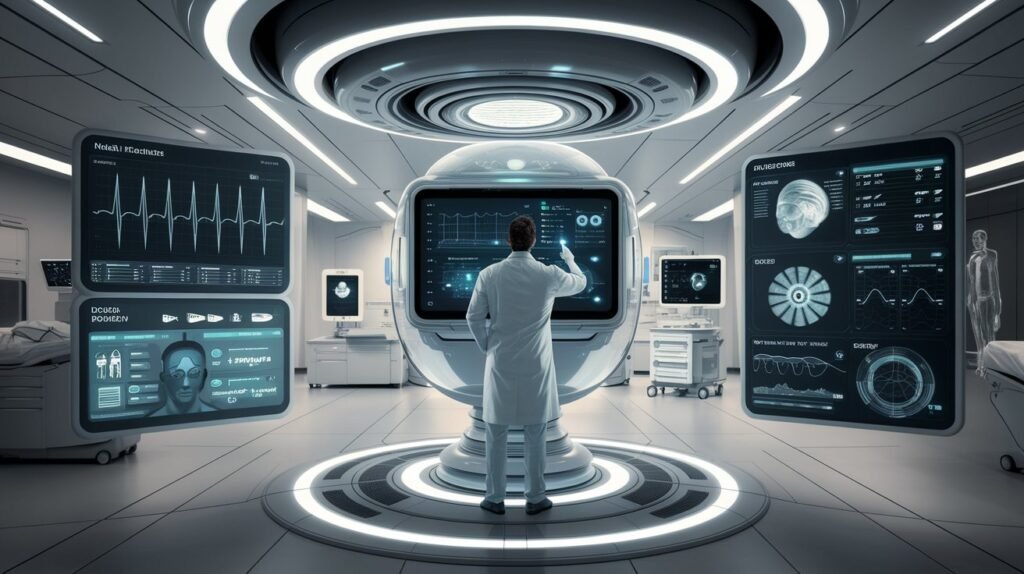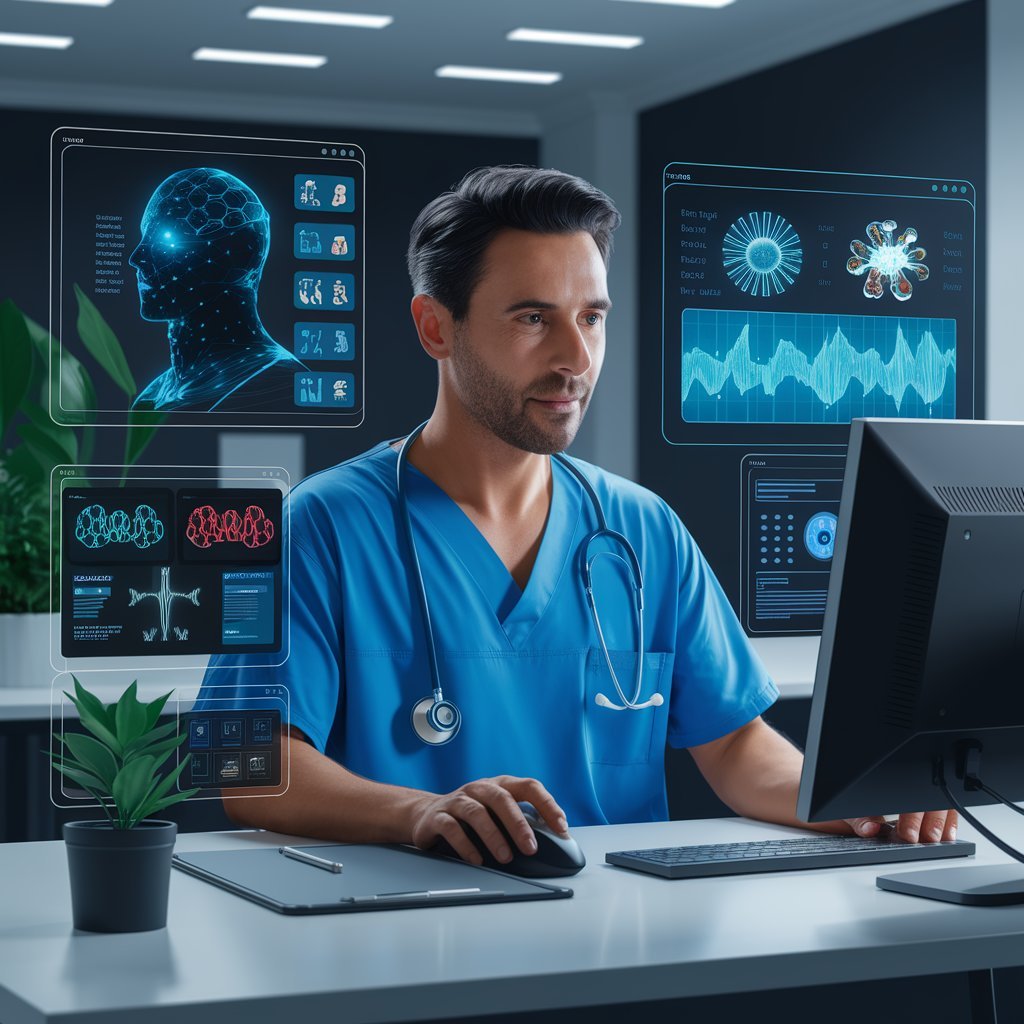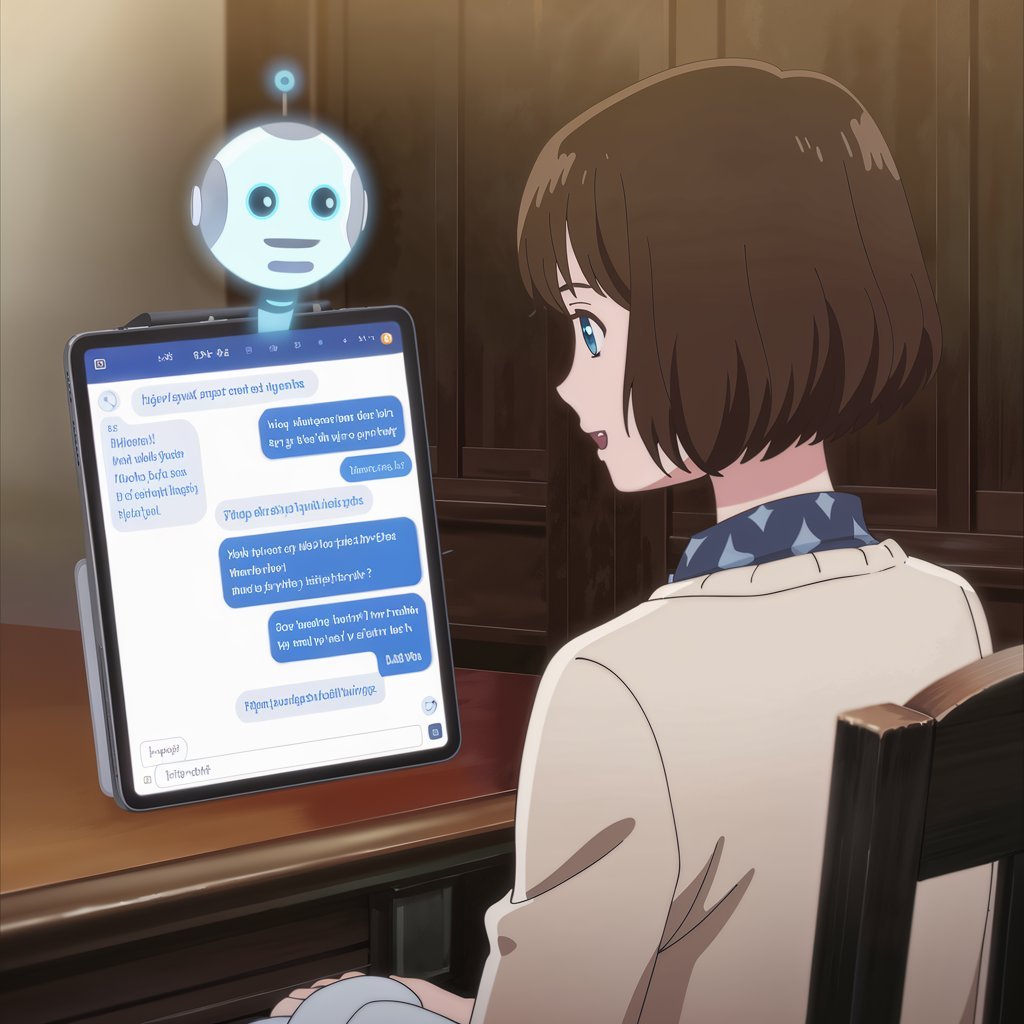1. Introduction
In 2025, AI in healthcare is no longer just a technological upgrade — it is reshaping how doctors diagnose illnesses, support patients, and deliver life-saving care. From automated documentation and predictive analytics to personalized treatment plans, AI in Healthcare 2025 is improving clinical efficiency, reducing administrative burden, and helping medical teams make faster, more accurate decisions that benefit patients across hospitals, clinics, and remote-care environments in the US, UK, and beyond.

As we know, nowadays AI is already making changes and more productivity in the healthcare field. From streaming operations to enhancing patient interactions, AI plays its very important role in our daily routines.
With the help of intelligent systems of AI, it is helping healthcare professionals to deliver timely and accurate results. Hence, it is better for patient experiences and outcomes. No doubt, in the coming era of 2025, it will be exciting to consider the advancements as the enhancements will influence our healthcare systems.
✔️ Key Takeaways – AI in Healthcare 2025
- AI in Healthcare 2025 is improving diagnostics, treatment accuracy, and patient monitoring.
- AI-powered medical scribes reduce documentation workload and enhance doctor–patient interaction.
- Predictive analytics helps identify health risks early and reduces hospital readmissions.
- Personalized treatment plans support more effective and tailored medical care.
- Ethics, privacy, and regulatory compliance remain essential for safe AI adoption in healthcare.
Table of Contents
2. Current Applications of AI in Healthcare
Medical Note-Taking and Documentation
If we go further, the main difficulty for the healthcare professionals is to handle “medical documentation”. Enter AI-powered medical scribes. So, these smart tools can definitely reduce the tension of note-taking and in result, the doctors can focus more on their patients.

For instance, in the past year of 2024, digital scribe startups such as Nabla, Heidi, Corti, and Tortus raised a whopping 0 million to develop AI tools aimed at automating clinical documentation.
Hence, because of investment in AI tools, it saves time for physicians which improves patient interactions. As an outcome, this action leads to better patient care.
Predictive Analytics for Patient Monitoring
In the healthcare field, there is another aspect which has to be considered is handling “remote patient monitoring”. With the help of these AI tools used in healthcare, the healthcare teams will be alarmed timely so that it improves patient safety and significantly reduces hospital readmissions.
With the rise of AI in Healthcare 2025, hospitals are adopting smarter diagnostic systems and automation technologies to improve patient outcomes.

There is a use case founded by PudMed Central in the research article which shows how such predictive analytics can transform patient care. Hence, it ensures that individuals or patients receive the right care at the right time.
These innovations show how AI transforming patient care is becoming a practical reality rather than a future concept.
Personalized Treatment Plans
Moreover, there is another enhancement in the healthcare field which is known as “Personalized medicine & treatment plans”. AI can assist healthcare professionals to create perfect and accurate treatment plans by analyzing patients’ genetic profiles.

This help from AI tools enhances the effectiveness of therapies and gives better outcomes.
3. Emerging Trends in AI Healthcare
Integration of AI in Clinical Decision Support
We can say that the integration of AI technology into clinical decision support systems is tremendous and very productive. In the diagnosing stage, AI tools help the healthcare professionals in various conditions and planning to provide best courses of treatment.

According to thought leader Bernard Marr, the potential for AI to assist in complex diagnostic tasks is becoming a reality, and we’re just scratching the surface of what it can do.
AI-Powered Virtual Health Assistants
In today’s world of AI technology, AI chatbots are also enhancing patients’ interaction. To handle immediate queries, to help and manage patients, schedule appointments and to provide basic medical advice to the patients, these virtual health assistants are very useful in the healthcare field.

As noted by Mobiloitte, this automation is paving the way for a more smoothly run healthcare experience.
4. Challenges and Considerations
Data Privacy and Security
As far as the challenges and considerations are concerned, along with the benefits of AI, there are some factors of data privacy and security.

We know that protecting patient information is very important and AI systems process large amounts of sensitive data, the healthcare professionals and the entire healthcare industry must prioritize protection of these details of patients.
Regulatory Compliance
There are some more factors which rise because of the integration of AI tools in the healthcare field or industry. It is to be ensured that the usage of AI tools are safe, effective and trustworthy as well as that these AI tools have the capability to maintain high standards for the patient care.
Ethical Implications
Last but not least, the ethical implications of AI in the healthcare industry can not be ignored. There are some critical considerations like decision making processes, biases in AI algorithms etc should be checked and tackled by the healthcare professionals to prevent damages which may rise in the future.
If you want to read more about Ethics in AI, CLICK HERE to read about OpenAI’s Whistleblower Balaji’s article!
5. The Future of AI in Healthcare
Predictions for 2025

Hence, looking forward to the current year of 2025, we can expect huge advancements and enhancements in AI technology in the healthcare industry. We can say there could be introduced more sophisticated diagnostic tools, improvement in predictive analytics and a wider acceptance of AI technology in daily routines of patient care.
Potential Impact on Patient Care
In the upcoming future world, we might see quicker diagnosis, more personalized treatment plans, and enhancements in the healthcare industry.

No doubt, day by day, these technologies continue to evolve, the quality of patient experiences and outcomes will likely improve accordingly.
6. Conclusion
At the end! We have to summarize the content of the whole article based on the healthcare field or industry and how AI tools affect it. AI transforms patient care by efficiency, personalizing treatment and streaming processes.
As we are now living in 2025, it is concluded that the relationship between AI technology and healthcare grows gradually and continuously, hence, it is promising a future filled with improved and advanced health outcomes which is beneficial for our environment. Across the US and UK, organizations investing in AI healthcare applications are reducing operational costs and enhancing treatment quality.
Let’s make this place a Heaven!

As we move deeper into AI in Healthcare 2025, the future of patient care looks smarter, faster, and more personalized than ever before. By adopting responsible AI-powered systems, healthcare organizations can improve clinical accuracy, support medical teams, and deliver better outcomes for patients worldwide.
If you found this guide helpful, follow AI – The Hub for more practical insights on AI, technology, and innovation — and stay ahead of the future of healthcare.
AI – The Hub
The Hub For Everything AI. The Future!
FAQs
What is AI in healthcare?
AI in healthcare refers to the use of artificial intelligence technologies to analyze data, assist in diagnostics, personalize treatments, and improve patient interactions.
How does AI improve patient care?
AI improves patient care by streamlining documentation, providing predictive analytics for monitoring patient conditions, and personalizing treatment plans.
What are the risks associated with AI in healthcare?
Risks include data privacy concerns, the need for regulatory compliance, and ethical implications related to decision-making processes.
How is AI expected to evolve in healthcare by 2025?
By 2025, AI is expected to become more integrated into clinical decision-making, offering greater predictive capabilities and personalized care for patients.

2 thoughts on “AI in Healthcare 2025 – Transforming Patient Care, Efficiency & Outcomes!”